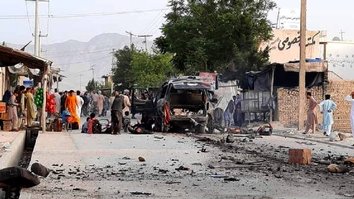KABUL -- A blast that ripped through a mosque in the Khair Khana neighbourhood of Kabul on Wednesday (August 17) has killed at least 21 people and wounded 33 others, police said Thursday.
"The bomb explosion occurred at the Abu Bakr al-Sadiq Mosque when a large number of people were performing evening prayers," Kabul police spokesperson Khalid Zadran said in a statement.
The Italian non-governmental organisation Emergency, which operates a hospital in Kabul, said Wednesday evening it had received 27 victims, including three fatalities.
Most of the patients were suffering "shell and burn injuries", it said via email.
![Afghans pray at a grave of victims, after a burial ceremony on the outskirts of Kabul on August 18, a day after a blast tore through the Abu Bakr al-Sadiq Mosque in the capital. [Wakil Kohsar/AFP]](/cnmi_st/images/2022/08/18/36724-000_32gp83p-585_329.jpg)
Afghans pray at a grave of victims, after a burial ceremony on the outskirts of Kabul on August 18, a day after a blast tore through the Abu Bakr al-Sadiq Mosque in the capital. [Wakil Kohsar/AFP]
In a later tweet, the hospital said five children were among those it treated, including a seven-year-old.
As of this writing, no group has claimed responsibility for the attack on Abu Bakr al-Sadiq Mosque, which has an adjoining madrassa.
The mosque's prayer leader, Maulvi Amir Mohammad Kabuli, a scholar and preacher of Sufi Islam, was targeted and the majority of the victims were seminary students, Afghan Islamic Press reported.
Kabuli was killed, an eyewitness said, according to the Associated Press.
"He was my cousin; may God forgive him," said a neighbourhood resident who gave his name as Masiullah, describing how he learnt of his relative's death in the blast.
"One year had passed from his marriage, he was 27 years old, and his name was Fardin... he was a good person."
Targeting minorities
The number of bombings across Afghanistan has declined since last August, but several attacks -- many targeting minority communities -- have rocked the country in recent months, including some claimed by the "Islamic State of Iraq and Syria" (ISIS).
ISIS has regularly targeted members of Afghanistan's minority communities -- including Shia, Sufis and Sikhs.
ISIS earlier this month claimed responsibility for a series of bombings targeting Kabul's Shia residents that killed at least 10 people.
The explosions occurred in a west Kabul neighbourhood that is mainly inhabited by members of the ethnic Hazara community, who are mostly Shia.
The blasts came just days ahead of Ashura, when worshippers gather at mosques and take part in processions marking the death of the Shia Imam Hussein Ibn Ali, grandson of the Prophet Muhammad.
In June, ISIS claimed an attack on a gurdwara in Kabul that left two dead and at least seven wounded.
In a message posted on its Amaq propaganda site, ISIS said that the attack targeted Hindus and Sikhs and the "apostates" who protected them.








The people of Afghanistan were deceived by the promises of Khalilzad and the Taliban based in Qatar. Khalilzad used to say that Taliban has changed. The Taliban also said that they have learned from their first era, but Taliban came to power after a conspiracy planned by Khalilzad. And the Taliban became more brutal than before. The Taliban were bragging. They chanted all day. They were deceiving the people of Afghanistan. They said that the Taliban can provide security in Afghanistan, and that Afghanistan will have peace when the Taliban come to power. But now? ISIS launches explosions every day, they kill innocent people, religious wars are about to happen. Theft and banditry has spread all over the country. The so-called resistance groups also attack every now and then. As the economic situation worsens, people join the ranks of ISIS out of necessity. And this situation has made the future of Afghanistan face very serious challenges. Now neither Khalilzad consider himself responsible nor the Qatari diplomats do. All consciences are asleep and the world is watching the killing of Afghans. :(
Reply1 Comment